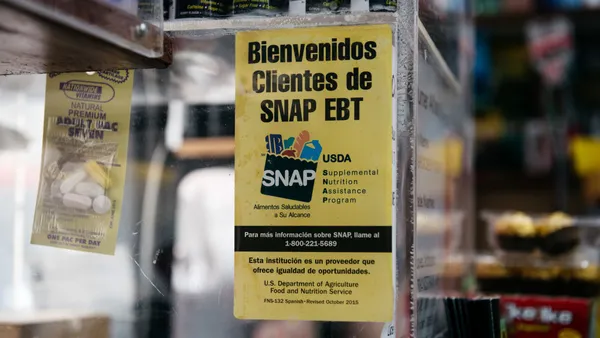Dive Brief:
- The Food Marketing Association (FMI) is pushing back on a portion of a bill passed this week by the U.S. Senate that would compel retailers to include specific country-of-origin details in descriptions of products they sell online.
- The organization said in a statement that the U.S. Innovation and Competition Act would impose requirements that would be cumbersome and expensive for retailers to implement and conflict with existing rules administered by the USDA.
- The provisions FMI is concerned about are part of a sweeping effort by lawmakers to shore up U.S. international competitiveness.
Dive Insight:
FMI's concern centers on stipulations in the bill passed Monday by the Senate that would require food retailers to let online customers know where exact products they sell through their e-commerce channels are produced.
Complying with the requirements, which would be enforced by the Federal Trade Commission, would pose technological challenges for retailers, FMI said in its statement. Retailers would have to choose between investing in real-time inventory tracking of every product covered by the requirements, cutting back on what they sell online, or canceling orders for goods that cannot be sourced at the store level with the same country identified online, the organization said.
"Now is not the time to place additional, duplicative burdens on essential industries like food retailers with no additional benefit to customers. Online purchasing by customers has increased exponentially due to the COVID pandemic and retailers have expanded their online product offerings at significant costs to meet consumer needs," Andy Harig, FMI's vice president of tax, trade, sustainability and policy development, said in the statement.
The online country-of-origin requirements are wrapped in a broad package designed to help the United States compete with China by investing federal money in U.S. technology. The bill, which has drawn widespread support, would direct almost $250 billion toward research and development.
On the day the Senate approved the legislation by a bipartisan, 68-32 vote, FMI joined other food industry groups, including the National Grocers Association (NGA) and the Produce Marketing Association (PMA), in asking lawmakers not to include the country-of-origin requirements in the bill. The new rules "would be inconsistent with USDA’s existing [labeling] program and unworkable for agricultural producers, food manufacturers and grocery retailers," the organizations wrote in their June 8 letter.
The FMI, NGA and PMA also signed a May 21 letter from another coalition of industry groups to Sens. Maria Cantwell and Roger Wicker, the leading members of the Senate Committee on Commerce, Science and Transportation, urging the panel to cut the country-of-origin language from the bill.
FMI said it would continue to try to jettison the portion of the bill that would override the USDA's current system for letting customers know where products they buy come from. The legislation needs to pass the House of Representatives before heading to the White House to be signed into law by President Joe Biden, who has said he supports the measure.
According to FMI, the country-of-origin labeling requirements currently administered by the USDA's Agricultural Marketing Service are sufficient. The program, which requires grocers to provide information about the source of foods like lamb, goat, chicken, fish, produce and nuts, but don't require them to provide that information online, has a high compliance rate and is efficient and cost-effective, the organization said.
The current drive by lawmakers to require retailers to provide country-of-origin information for products they sell online originated with Sens. Tammy Baldwin and Rick Scott, who introduced legislation to accomplish that in May 2020.
"Regardless of whether shopping online or in a store, Americans have a right to know whether the products they buy are being made right here in America, by American workers,” Baldwin said in a statement at the time she and Scott introduced the bill, known as Country-of-Origin Labeling (COOL) Online Act. "With more and more consumers buying their goods online, we must ensure online retailers are being just as transparent as brick-and-mortar stores."













